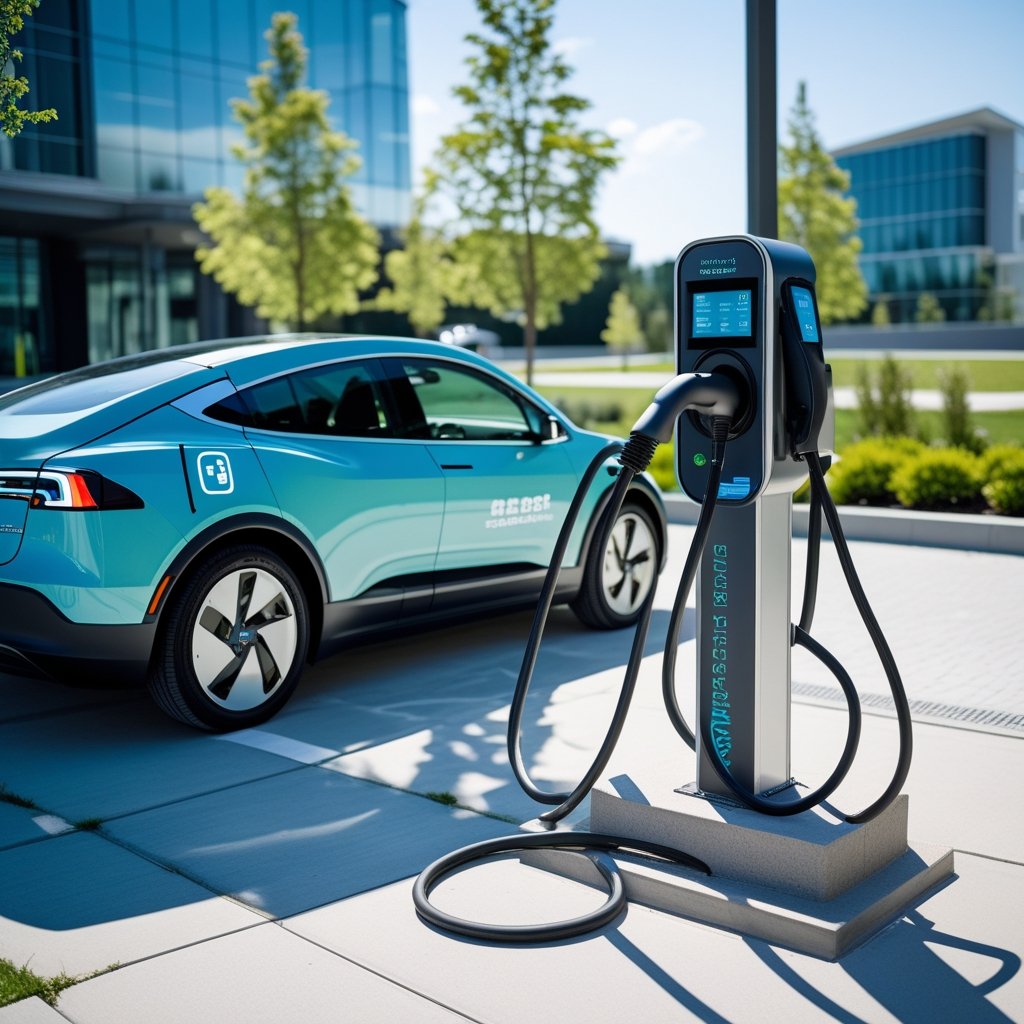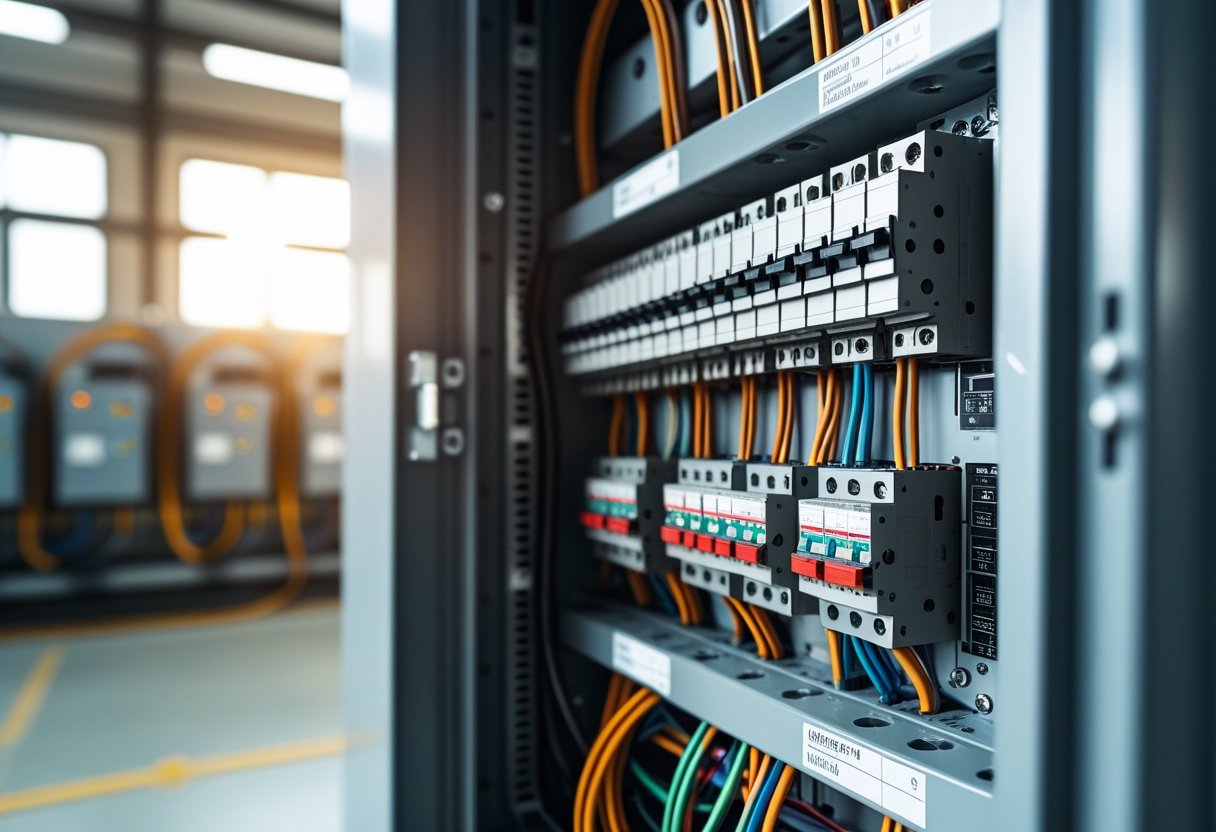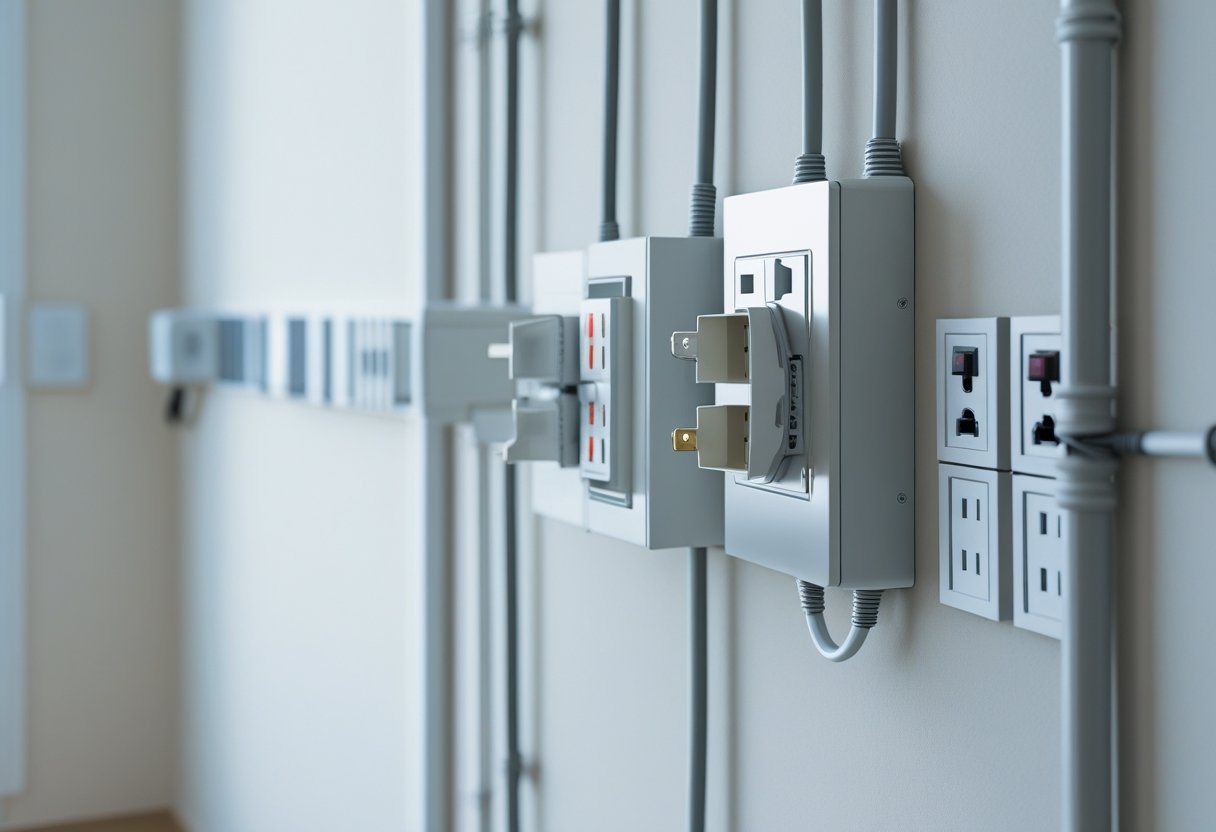When you need an electrician for your EV charger setup, choose someone experienced and licensed. The best electrician for EV charger installation understands local codes, handles panel upgrades if needed, and ensures your charging station is safe and reliable.
This keeps your home protected while your EV gets the power it needs. A great electrician makes the process simple by managing permits and new circuit installations.
They should have a proven track record and years of experience with EV chargers. This helps avoid issues and delays.
You want someone who prioritizes safety and knows how to work with modern electrical panels. That way, your charging station installation fits your home’s needs now and in the future.
Why Choose a Professional Electrician for EV Charger Setup
A professional handles your EV charger installation to keep things safe, legal, and running smoothly. From proper wiring to meeting rules and getting the fastest charging speeds, a skilled electrician helps you avoid future problems.
Safety Considerations
Installing an EV charger involves high voltage electricity. A professional knows how to handle this safely.
They make sure the wiring and circuit breakers can handle the load without overheating or causing fires. They also install a dedicated circuit for your charger.
This reduces the risk of overloading your home’s electrical system. Using a licensed electrician ensures the job meets safety standards, protecting your home and family.
If you try to install the charger yourself, you might miss important safety steps. This could put you at risk or void your car’s warranty.
Compliance With Local Codes
Every area has rules for electrical work, including EV chargers. These rules cover how the charger must be installed to keep things safe and reliable.
A professional electrician knows these local codes well. They handle permits and inspections too.
Your charger installation will pass official checks. If something isn’t up to code, the electrician fixes it before it becomes a problem.
Following codes also helps with insurance. If you don’t meet these rules, claims could be denied if there’s an accident linked to your charger.
Maximizing Charger Performance
Not all EV chargers are the same. Some charge faster but require special wiring or upgrades to your electrical panel.
A professional electrician helps you choose the right charger for your home. They also install the charger where it works best for you, such as your garage or driveway.
This makes charging convenient and efficient. Proper installation prevents power losses and electrical faults.
You get reliable charging every time, saving you time and hassle.
What a Pro Electrician DoesBenefit to You Checks home electrical systemAvoids overloads and firesSecures permits and inspectionsMeets legal requirementsInstalls dedicated circuitFaster, safer chargingRecommends best charger typeMatches your needs and home setup
Qualities of the Best Electrician for EV Charger Installation
When you hire an electrician for your EV charger, choose someone who knows the job well. They should have the right experience, up-to-date knowledge, and positive feedback from other customers.
These qualities help ensure your charger is installed safely and works properly.
Certified Experience With EV Chargers
You need an electrician with real experience installing EV chargers. This work is different from regular electrical jobs because chargers use specific equipment and handle high power loads.
Look for someone who has done multiple EV installations before. Certification matters.
Electricians with certifications related to EV systems understand technical details and safety standards. This lowers the chance of problems during or after installation.
Ask if they know how to handle your specific charger model. An experienced installer can spot potential issues with your home’s wiring and give advice on the best setup.
Up-To-Date Training and Credentials
Technology around EV chargers keeps changing. The best electricians update their skills regularly to keep up with new products and codes.
Make sure your electrician has current licenses or certificates. This means they have met state and local rules, including safety standards for EV charging.
Training helps electricians solve problems if something unexpected comes up during installation. It shows they care about doing the job right and staying safe.
Strong Customer Reviews
Check what past customers say about the electrician. Look for reviews online or ask for references.
Find comments mentioning the electrician was on time, explained things clearly, and cleaned up after the work. Positive feedback on reliability and workmanship is important.
If you see repeated complaints about delays or poor quality, look elsewhere. Good electricians take pride in making customers happy with a smooth and efficient installation.
Evaluating Electricians for Residential and Commercial Installations
When choosing an electrician for your EV charger, focus on how they inspect your property and tailor the setup to your needs. These steps help ensure the work is safe, code-compliant, and efficient for your home or business.
Site Assessment Process
A good electrician starts with a thorough site assessment. They check your electrical panel’s condition, existing wiring, and power capacity.
This helps them see if your current system can support an EV charger or if upgrades are needed. They’ll also look at where you want to install the charger.
Distance from the panel, weather exposure, and convenience for your vehicle all matter. A proper assessment prevents surprise costs and safety risks later.
During this process, the electrician should explain what they find. You want clear information about what is needed and why, including any permits or inspections required.
Customizing Solutions for Your Needs
Your EV charger setup should fit how you use electricity and your daily routine. A skilled electrician customizes the plan based on your vehicle’s charging requirements and your property’s setup.
For residential installs, this means choosing the right charger type and making sure it’s placed where you’ll use it most easily. For commercial spaces, electricians consider multiple charging points, peak usage, and energy management.
They may suggest options like load management systems or upgrading your panel if you have high power needs. A tailored solution ensures your charger runs smoothly without unexpected outages or extra costs.
Understanding EV Charger Types and Compatibility
Knowing the types of EV chargers and how they fit with your vehicle is key to choosing the right setup. Different chargers work at different speeds and use different connectors, so it's important to match these to your car and your home power supply.
Level 1, Level 2, and DC Fast Chargers
Level 1 chargers use a standard 120-volt outlet. They are slow and add about 3 to 5 miles of range per hour.
These chargers are best if you drive little each day or need a simple setup. Level 2 chargers use a 240-volt outlet and charge faster.
They can add 15 to 30 miles of range per hour, depending on the charger’s power. This type is the most common for home use.
You will likely need an electrician to install a Level 2 charger. DC Fast Chargers work differently.
They use direct current to charge your battery quickly, adding up to 80% range in 20 to 30 minutes. These chargers are mostly found in public places, not homes, because they require special equipment and high power.
Charger TypeVoltageCharging Speed (miles/hour)Common Use Level 1120V3 - 5Home, slow chargingLevel 2240V15 - 30Home, faster chargingDC Fast Charger400-900V (DC)200+ (fast charging)Public stations, quick top-up
Brand and Vehicle Compatibility
Most EVs work with Level 1 and Level 2 chargers that use a standard connector, usually called J1772. Tesla vehicles use their own connector but come with an adapter for J1772 chargers, so you can use most non-Tesla chargers.
DC Fast Chargers have different connector types. CCS is common for many brands, while Tesla uses its own Supercharger network.
Not all vehicles can use every fast charger, so check your car’s charging port before choosing a charger. When picking a charger, consider your vehicle’s maximum charging speed and connector type.
Matching these ensures you get the best charging performance without extra hassle or cost.
Cost Factors in EV Charger Setup
When installing an EV charger at home, expect a few key costs. These will vary based on your home's electrical setup and the type of charger you choose.
You may also find opportunities to lower your expenses through savings programs.
Upfront Installation Expenses
The price to install an EV charger usually falls between $546 and $2,750. This range depends on the charger type and how complex your home's wiring is.
If your electrical panel needs an upgrade or a new dedicated circuit, that can add to the cost. Labor costs are another part of the total price.
If your electrician must do extra work, such as running wiring through walls or upgrading breakers, expect to pay more. Choosing a Level 2 charger, which charges faster, typically costs more to install than a Level 1 charger.
Potential Rebates and Incentives
You might be able to reduce your installation costs through rebates or incentives. These often come from local or state governments, utility companies, or federal programs.
Some programs cover a portion of the equipment or labor costs. To find these deals, check with your electrician or local utility.
Applying for these incentives before your installation can save you a few hundred dollars or more. Eligibility rules and available amounts may change depending on where you live.
Timeline and Scheduling Expectations
Knowing how long the installation will take and what you need to do before the electrician arrives helps the whole process go smoothly. You can plan better and avoid surprises by understanding these details.
Typical Project Duration
Installing an EV charger usually takes 4 to 8 hours. This depends on your home's electrical setup and the type of charger you choose.
If your electrical panel needs an upgrade, the job may take longer or stretch over multiple days. The electrician might need to get permits first, which can add extra time.
This sometimes takes a few days or weeks, depending on local rules. Scheduling also depends on the electrician’s availability.
You can speed things up by choosing a professional with experience in EV charger installations. They work faster and avoid common issues.
Preparing for Installation Day
Before the electrician arrives, clear the area around your main electrical panel and the spot where you want the charger. Make sure it’s easy to access.
Have your required permits ready if you got them in advance. If you don’t, ask your electrician whether they handle this for you.
Discuss any questions with the electrician beforehand. Confirm the time they will come and how long the work will take.
Plan for power to be off during the installation. This might last a few hours but should be explained before work starts.
Post-Installation Support and Maintenance
After your EV charger is installed, you’ll want reliable support to keep it running smoothly. A good electrician offers post-installation services like check-ups and repairs if needed.
Regular maintenance is important. Your electrician might recommend inspecting the wiring and connections every year.
This can catch problems early and prevent bigger issues later. If your charger stops working or shows errors, you want quick help.
Many electricians provide fast response times for repairs. Some even offer flat-rate pricing, so you know the cost upfront.
Here’s what you can expect from good post-installation care:
- Safety inspections to meet electrical codes
- Troubleshooting and repairs for any faults
- Cleaning and upkeep advice for your charger
- Support for software or firmware updates
Keeping in touch with your electrician after installation means you get expert help whenever you need it. This can extend the life of your EV charger and make your charging experience worry-free.
Tips for a Smooth EV Charger Experience
Start by choosing a licensed electrician who knows about EV charger installation. This helps make sure the job is safe and meets local rules.
A skilled electrician will handle permits and install everything correctly. Check your home’s electrical system before installation.
Older homes might need upgrades to handle the charger’s power. Knowing this early can help avoid surprise costs or delays.
Think about the type of charger you want. Level 2 chargers are faster but may cost more to install.
Level 1 chargers are slower but use a regular outlet. Pick the one that fits your daily needs.
Keep your charging area clear and dry. This makes it safer and easier to plug in every day.
Place the charger where your car usually parks. Use a schedule if your utility company offers lower rates at night.
Charging at cheaper times can save you money on electricity.
Here’s a quick checklist for your EV charger setup:
TipWhy It Helps Hire a licensed electricianSafe and code compliantInspect home electrical systemAvoid surprisesChoose the right chargerMatch your charging needsKeep charging area cleanEasy and safe useCharge during off-peak hoursSave money on energy bills
Frequently Asked Questions
Choosing the right electrician for your EV charger means thinking about experience, certification, and costs. Installation time and specific charger brands also play a role.
What factors should I consider when choosing an electrician to install my home EV charger?
Look for someone with experience installing EV chargers. You want an electrician who knows local permits and electrical codes.
Check if they offer a warranty or follow safety standards. Good communication and positive reviews also matter.
How do I verify if an electrician is certified to install electric vehicle charging stations?
Ask if they have licenses for electrical work in your state. Some electricians hold special certifications for EV chargers.
You can check with your local electrical board or licensing agency online to confirm.
Can you recommend a licensed electrician with experience in EV charging systems?
AAA Electrical Services is known in the Sacramento area for EV charger installations. You can search locally for providers with good reviews and proven EV charger experience.
What are the potential costs associated with hiring an electrician for EV charger installation?
Installing an EV charger can cost between $546 and $2,750. Costs vary by charger type, your home's electrical system, and any required permits.
Ask the electrician for a detailed quote.
How long does the installation process for a home EV charger typically take?
Most home EV charger installations take a few hours. Complex electrical work can extend the time.
On average, expect it to take anywhere from 2 to 6 hours.
Are there any specific brands or types of EV chargers that certain electricians specialize in?
Some electricians specialize in popular brands like ChargePoint, Tesla, or JuiceBox.
Ask the electrician if they have experience installing the brand or type you want.





